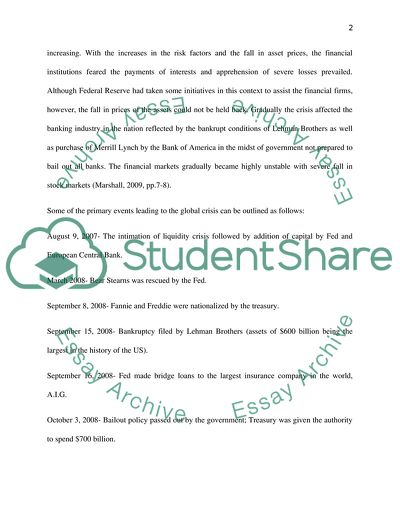Cite this document
(Discuss and analyse the recent global financial crisis and consequent Essay - 1, n.d.)
Discuss and analyse the recent global financial crisis and consequent Essay - 1. https://studentshare.org/finance-accounting/1769903-discuss-and-analyse-the-recent-global-financial-crisis-and-consequent-credit-crunch-within-an-international-finance-perspective-include-the-events-leading-up-to-the-crisis-economic-and-financial-consequences-government-responses-and-lessons-to-be-learn
Discuss and analyse the recent global financial crisis and consequent Essay - 1. https://studentshare.org/finance-accounting/1769903-discuss-and-analyse-the-recent-global-financial-crisis-and-consequent-credit-crunch-within-an-international-finance-perspective-include-the-events-leading-up-to-the-crisis-economic-and-financial-consequences-government-responses-and-lessons-to-be-learn
(Discuss and Analyse the Recent Global Financial Crisis and Consequent Essay - 1)
Discuss and Analyse the Recent Global Financial Crisis and Consequent Essay - 1. https://studentshare.org/finance-accounting/1769903-discuss-and-analyse-the-recent-global-financial-crisis-and-consequent-credit-crunch-within-an-international-finance-perspective-include-the-events-leading-up-to-the-crisis-economic-and-financial-consequences-government-responses-and-lessons-to-be-learn.
Discuss and Analyse the Recent Global Financial Crisis and Consequent Essay - 1. https://studentshare.org/finance-accounting/1769903-discuss-and-analyse-the-recent-global-financial-crisis-and-consequent-credit-crunch-within-an-international-finance-perspective-include-the-events-leading-up-to-the-crisis-economic-and-financial-consequences-government-responses-and-lessons-to-be-learn.
“Discuss and Analyse the Recent Global Financial Crisis and Consequent Essay - 1”. https://studentshare.org/finance-accounting/1769903-discuss-and-analyse-the-recent-global-financial-crisis-and-consequent-credit-crunch-within-an-international-finance-perspective-include-the-events-leading-up-to-the-crisis-economic-and-financial-consequences-government-responses-and-lessons-to-be-learn.


